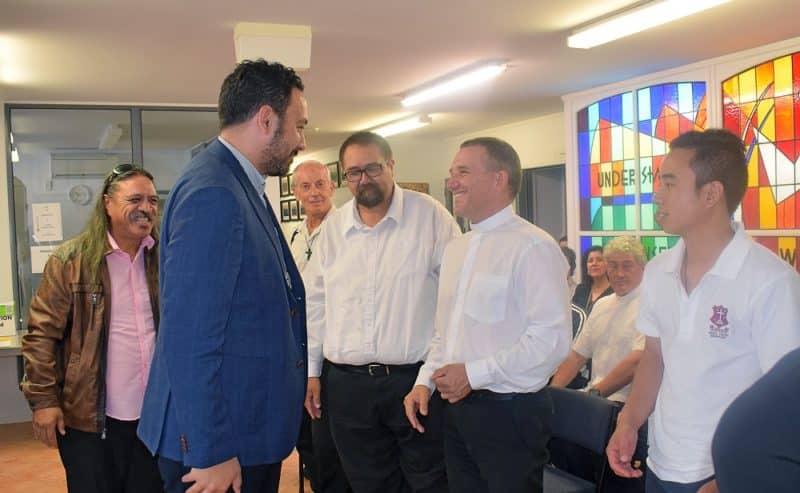The new tertiary education organisation, Te Kupenga — The Catholic Leadership Institute, plans to widen its net by reaching out to youth as well as to people on the margins of society.
Newly-appointed Te Kupenga chief executive Dr Areti Metuamate said he is looking at how to engage Māori and Pasifika people, in particular, who are “often the most under-represented in educational institutions”.
“What I’m really going to be working on is to try to think of ways that our courses and that our teachers can be connecting to communities beyond the communities we are connecting to,” he told NZ Catholic.
“For example, we have a number of courses that are taught online. What are we doing to go out and ensure that people in remote parts of New Zealand know about those courses?”
Te Kupenga was formed on January 1 in a merger of Good Shepherd College and The Catholic Institute of Aotearoa New Zealand. It has three operating units — Catholic Theological College (for tertiary courses and qualifications), National Centre for Religious Studies and the Nathaniel Centre for Catholic bioethics.
New Zealand’s Catholic bishops expect the new institute to play a vital role in training, educating and forming Catholic seminarians and lay leaders.
Dr Metuamate said that, to increase the number of students, they will be “going out to communities and talking to people in their communities. And that we don’t seem like some foreign organisation that’s only on a website or that’s only in a brochure”.
This means going to secondary schools, meeting with careers advisors and talking to year 12 students about the courses Te Kupenga provides and the possibility of priesthood.
“It’s just about getting out there and talking to young people about options available to them. When I was in school . . . no one ever came to us to talk about the possibility of being a priest. Sometimes, people just need to hear about an idea, plant that seed and they go away and think about it,” he said.
Dr Metuamate stressed, though, that Te Kupenga is not just for those preparing for priesthood.
“[Te Kupenga] is for anyone who’s in the Church and actually, people outside the Church who want to learn about what it means to be a Christian, what it means to be Catholic, what it means to have a faith. There are courses for all those people, too,” he said.
Dr Metuamate was given a Mihi Whakatau (formal welcome) at the formerly Good Shepherd College site in Ponsonby, Auckland on February 21.
Dr Metuamate said he was glad to see Manuel Beazley, Vicar for Māori in Auckland diocese, in a leadership role in the Church because “the leadership of the Church needs to reflect the people of the Church”.
“I’m really keen to see our organisation reach out more to Māori and Pasifika people, and Asian New Zealanders as well, because there are large numbers of those peoples and they are not as engaged as they should be,” he said. “And sometimes, that is because it’s hard for them to see a role for themselves as leaders in the Church.”
He also met then Bishop-elect Michael Gielen, who was the celebrant at the Mass for the opening of the academic year. Bishop Gielen was ordained auxiliary bishop on March 7, 2020.
“[Bishop-elect Gielen] is the sort of person who is the future of our Church, a person who is connected to young people,” Dr Metuamate noted.
Beginning and End
Bishop Gielen said being at the opening Mass of Te Kupenga feels like a beginning and an end for him.
“It feels like the end of a journey for me. This would be [the] sixteenth Academic Mass for me. It feels like a bit of a farewell,” he said as he thanked the staff and the students for their support over the years.
“I assure you of my prayers as I launch out on my waka to the different parts the Lord has in store for me in the Auckland area.”
In his homily, he referred to the Gospel reading (Mark 8:34 – 9:1), saying everyone is called to give their best for their faith.
“We are all called to these same words that Jesus has given us today. We are asked to give our best. There are no shortcuts, no easy options, no comfortable roads, no computer programmes or secret passwords,” he said. “We have to step out . . . not just flock at the finish line, but reach there with a renewed sense of faith and vigour.”
Bishop Gielen said St Peter did not want to bear the cross of Jesus when he (St Peter) denied Jesus three times.
The bishop then contrasted this with St John Henry Newman who “took the hard road” when leaving the Anglican communion. St John was pretty much rejected by his community.
“Even his family and friends struggled [and] misunderstood what he was doing,” Bishop Gielen added.
But St John went on to establish the Catholic University of Ireland, now University College, Dublin.
“St Peter and St John Henry Newman were faced with a choice: save their lives or lose their lives. Live according to their own limits or take risks and live by Jesus’ limits. We, too, are faced with the same choice,” he said.
“Give your best. Lose your life. You’ll never regret it.”

Reader Interactions